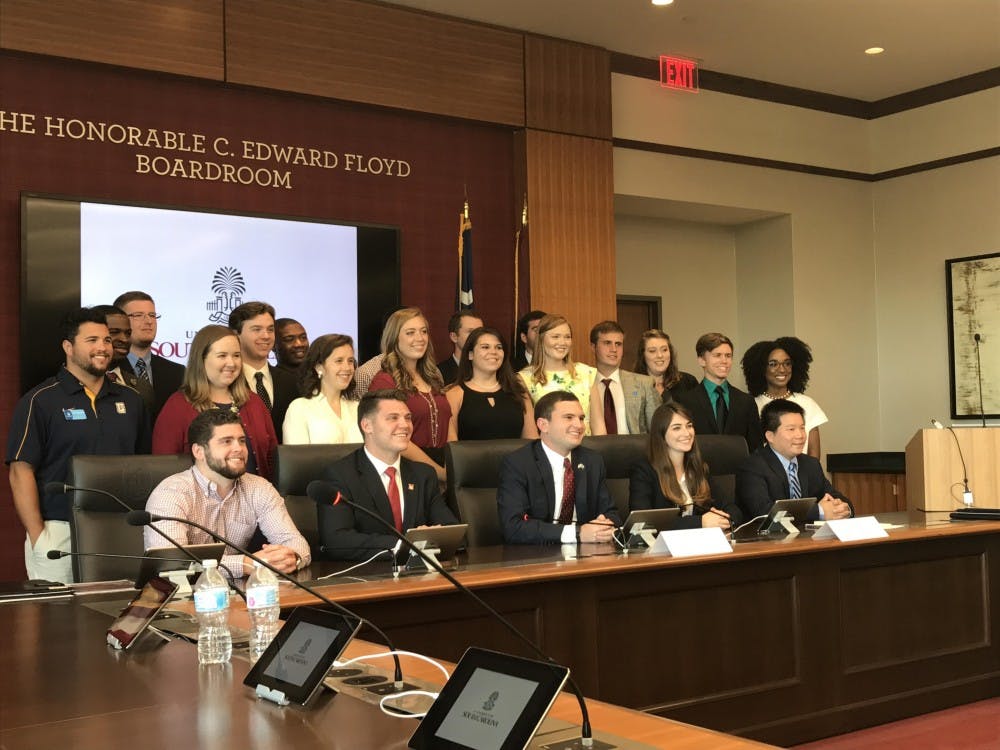Student government representatives statewide came together Saturday at USC's Alumni Center to discuss empowering South Carolina's 100,000-strong student demographic.
The first event of its kind, the South Carolina Student Body Presidents' Summit brought together representatives from 20 state colleges and universities from Greenville County to Conway for a discussion of issues facing Palmetto State scholars. Opened and closed by USC student body president Ross Lordo, the Summit featured an appearance from two members of the South Carolina House of Representatives and the signing of a two-page proclamation symbolizing dedication to uniting student voices.
Among other things, the gathered student body presidents used the proclamation to "affirm ... commitment to the principle that higher education should be affordable and accessible to all students, regardless of race, religion, color, ancestry, ethnicity, age, creed, national origin, sexual orientation, gender, sex, disability status or socioeconomic status as well as any other class protected under applicable law." Other sections were set aside to outline objectives for advocacy in local, state and federal government as well as student-specific issues such as campus sexual assault and hazing.
In the section highlighting issues of state government advocacy, mention is made of bond issuances to fund state universities and colleges. According to the proclamation, since 2000 South Carolina's bond issuances for higher education have amounted to one-seventh the amount issued by Georgia and one-twelfth that of North Carolina. With these numbers in mind, the proclamation asserts the presidents' intention to "call on all state representatives, state senators and the governor to make higher education a priority during the next legislative session" and "invite ... elected representatives to meet their student constituencies."
Finance was a key reason for the Summit's calling in the face of plummeting state funding for higher education. State appropriations, which comprised 23 percent of USC revenue a decade ago, will make up only 10.4 percent of this fall's budget. Meanwhile, the USC Board of Trustees voted on June 23 to increase tuition 3.46 percent for the 2017-18 academic year.
State Rep. Brandon Newton (R-Lancaster), a USC alumnus, warned the gathered student representatives that the days of South Carolina universities being funded 20 to 30 percent by the state are likely "gone." He added that context is key to effective arguments for state funding, saying that legislators already absorb too many arguments that ignore or distort key facts.
Or, in Newton's own words: "We hear a lot of bullcrap."
Newton is well familiar with the financial woes of South Carolina universities in this decade, having graduated from USC only last year. At 23, he is the youngest sitting member of the South Carolina House of Representatives.
Joining Newton on Saturday's panel was Rep. Micah Caskey (R-Lexington), who focused on higher educations as an investment. Caskey said that higher education is a difficult sell to state taxpayers who did not attend college. But, he said, that sell must be made to keep state universities subsidized.
"How do we do that in the context of our current practical landscape?" Caskey said. "And that's a thing that you got to ask yourself."
Drawing from census data, the U.S. Department of Education estimated that 35.2 percent of South Carolina residents aged 25-34 held a college degree in 2010. South Carolina's mark was just short of the national average of 39.3 percent and a far cry from Massachusetts' 54.3 percent, tops in the country.
When asked by College of Charleston student body vice president Tripp Keeffe how students can be effective advocates, Caskey advised that students in or out of student government reach out to state legislators and, echoing Newton, present thorough arguments when meeting with them.
"You should be empowering more people at your institutions, more club heads, everybody to be reaching out to your legislators to come and talk," Caskey said.
A Columbia native, Caskey received both of his postgraduate degrees from USC and maintains a law firm in West Columbia.
Jay Selesky, director of USC's Legislative Action Network, and former Clemson governmental affairs director Maggie Ambrose also presented the particulars of their universities' Student Higher Education Report Card. A joint undertaking of Clemson and USC student government officials, the Report Card singled out Assembly members for their respective house's "Honor Roll" for having voting records friendly to higher education. January's report placed 29 state senators (of 46 total) and 66 state representatives (124) on the Senate and House Honor Rolls.
Ambrose said Saturday that she didn't realize the power of South Carolina's student constituency until she began work on the Report Card in 2016.
"I didn't realize until we started working on the Report Card," Ambrose said. "There was a lot of pushback because everyone was saying, 'Oh my God, people are gonna look at this and ... it's going to make people mad.'"

